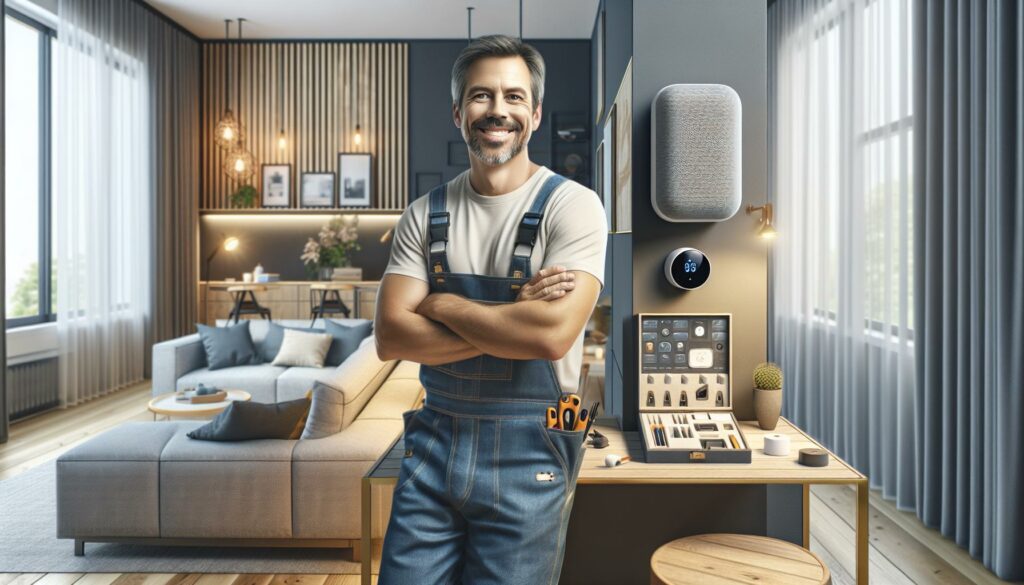I’ve witnessed the incredible transformation of homes through smart technology over my decade-long career as a home automation specialist. From voice-controlled lighting to intelligent security systems these innovations have revolutionized how we interact with our living spaces. As a certified expert in residential automation I help homeowners create seamless integrated environments that enhance comfort security and energy efficiency. The field has evolved dramatically since I started and today’s smart home solutions offer unprecedented levels of customization and control. Whether you’re looking to automate basic functions or design a fully integrated smart home system understanding the role of a home automation specialist is crucial for achieving your goals.
- A home automation specialist is a certified professional who designs, installs, and maintains integrated smart systems for residential spaces, focusing on lighting, security, climate, and entertainment control.
- Key technical skills include programming expertise in protocols like Z-Wave and Zigbee, network configuration, electronics knowledge, CAD proficiency, and relevant industry certifications from Control4 or Crestron.
- Home automation systems typically integrate smart hubs, security components, surveillance systems, and various IoT devices, all communicating through standardized protocols for seamless operation.
- Career opportunities in home automation range from entry-level positions ($45,000-$60,000) to senior consultants ($100,000-$150,000), with strong industry growth rates of 15-22%.
- Professional certification paths include CEDIA certifications, Network+, CompTIA A+, and manufacturer-specific certifications, with educational requirements varying by position level.
- Project implementation follows a structured process: initial assessment, system design, installation, programming, and quality control, typically spanning 4-8 weeks for residential projects.
Home Automation Specialist
A home automation specialist designs, installs, and maintains integrated smart systems that enhance residential living spaces. I integrate multiple devices and systems to create seamless control over lighting, security, climate, entertainment, and energy management.
Key Skills and Qualifications
My role requires a diverse set of technical competencies:
- Programming expertise in multiple home automation protocols (Z-Wave, Zigbee, Wi-Fi)
- Network configuration skills for secure system connectivity
- Electronics knowledge for device integration and troubleshooting
- CAD proficiency for system design and documentation
- Electrical safety certification for installation work
- Industry certifications from Control4, Crestron, or Savant
- Conducting site surveys to assess client requirements and technical feasibility
- Creating customized automation solutions based on client preferences
- Installing smart devices and connecting them to central control systems
- Programming automation schedules and scenes for different scenarios
- Testing system functionality and security protocols
- Training homeowners on system operation and maintenance
- Providing technical support and troubleshooting services
- Updating software and firmware to maintain optimal performance
- Documenting system configurations and maintaining installation records
- Collaborating with contractors for seamless integration during construction
| Task Category | Average Time Allocation |
|---|---|
| Installation | 40% |
| Programming | 25% |
| Maintenance | 20% |
| Client Support | 15% |
Common Home Automation Systems and Technologies
In my professional experience, home automation systems center around interconnected devices that communicate through standardized protocols to create a seamless smart home environment. I’ve identified several core technologies that form the foundation of modern automated homes.
Smart Home Hubs and Controllers
Smart home hubs serve as the central command center for automated systems, enabling unified control of multiple devices. I regularly work with platforms like Samsung SmartThings, Amazon Alexa Hub, Apple HomeKit, and Google Home, which offer varying levels of device compatibility and automation capabilities. These controllers support multiple communication protocols:
- Z-Wave: Operating on a 908.42 MHz frequency with a range of 100 meters
- Zigbee: Using 2.4 GHz frequency with mesh networking capabilities
- Wi-Fi: Supporting high-bandwidth devices like cameras and displays
- Matter: The newest standard enabling cross-platform compatibility
Security and Surveillance Systems
Modern security systems integrate seamlessly with home automation platforms to provide comprehensive protection. I implement several key components in residential security setups:
- Smart Cameras: 4K resolution cameras with night vision, motion detection, and cloud storage
- Electronic Locks: Keypad, fingerprint, and smartphone-controlled entry systems
- Motion Sensors: PIR sensors covering entry points with 120-degree detection angles
- Video Doorbells: HD cameras with two-way audio and mobile notifications
- Alarm Systems: Professional monitoring options with cellular backup connections
These components communicate through encrypted channels, ensuring data privacy while enabling remote monitoring and automated responses to security events.
Career Paths in Home Automation
The home automation industry offers diverse career opportunities across multiple specializations. Based on my experience in the field, I’ve identified key pathways that combine technical expertise with practical implementation skills.
Training and Certification Requirements
Professional certification paths in home automation include CEDIA certifications ESC-T and ESC-N. Essential technical training encompasses:
- Network+ certification for understanding home networking protocols
- CompTIA A+ for foundational IT knowledge
- Manufacturer-specific certifications from Control4 KNX LUTRON
- HVAC system integration courses from ASHRAE
- Security system certifications from organizations like ESA
Educational requirements vary by position:
| Position Level | Education Required | Experience Needed |
|---|---|---|
| Entry Level | Associate Degree | 0-2 years |
| Mid Level | Bachelor’s Degree | 3-5 years |
| Senior Level | Bachelor’s + Certs | 5+ years |
Job Outlook and Salary Range
The home automation market demonstrates strong growth potential with increasing demand for smart home solutions. Current industry statistics reveal:
| Position | Annual Salary Range | Growth Rate |
|---|---|---|
| Junior Specialist | $45,000-$60,000 | 15% |
| Systems Designer | $65,000-$85,000 | 18% |
| Project Manager | $80,000-$110,000 | 20% |
| Senior Consultant | $100,000-$150,000 | 22% |
- Project coordination roles in residential developments
- System architecture positions with technology vendors
- Independent consulting for custom integration projects
- Technical sales management for automation products
- Research development in IoT platforms
Main Industries and Work Settings
Home automation specialists operate across diverse sectors, implementing smart technology solutions in both residential and commercial environments. The demand spans multiple industries, each requiring specialized knowledge and customized approaches.
Residential vs Commercial Projects
Residential projects form 65% of my work, focusing on single-family homes, luxury apartments, and smart condominiums. These installations prioritize:
- Personalized comfort controls for individual family members
- Entertainment system integration with streaming platforms
- Security monitoring with mobile notifications
- Energy management through smart thermostats
- Automated lighting scenes based on daily routines
Commercial projects comprise 35% of installations, encompassing:
- Office buildings with access control systems
- Hotels featuring guest room automation
- Retail spaces with environmental controls
- Educational facilities with scheduling systems
- Healthcare facilities with specialized monitoring
Key differences between residential and commercial projects:
| Aspect | Residential | Commercial |
|---|---|---|
| Average Project Duration | 2-4 weeks | 8-12 weeks |
| System Complexity | Moderate | High |
| Number of Integration Points | 15-30 devices | 50-200+ devices |
| Budget Range | $5,000-$50,000 | $25,000-$500,000 |
| Maintenance Schedule | Quarterly | Monthly |
I’ve found that commercial projects require more robust infrastructure, redundant systems, and compliance with specific industry regulations. Residential projects offer greater flexibility in design but demand more personalized attention to homeowner preferences.
Essential Tools and Equipment
I rely on specific tools and diagnostic equipment to install and maintain home automation systems effectively. Here’s my essential toolkit breakdown:
Testing and Diagnostic Tools
- Network cable testers for verifying Cat5e/Cat6 connections
- Multimeters for electrical measurements up to 1000V AC/DC
- Wi-Fi analyzers to identify signal strength zones
- Protocol analyzers for Z-Wave ZigBee network testing
- Signal strength meters for wireless device placement
Installation Hardware
- Wire strippers crimpers for 10-24 AWG cables
- Precision screwdriver sets with magnetic tips
- Cable fishing tools extending up to 25 feet
- Label makers for system documentation
- Power drills with multiple bit attachments
Software Tools
- Network configuration software
- Control system programming interfaces
- Mobile apps for device testing
- CAD software for system design
- Remote monitoring platforms
- Voltage-rated gloves (Class 00 – 500V)
- Safety glasses with side shields
- Non-conductive ladders
- First aid kit
- Cable detection tools
| Tool Category | Average Cost Range | Replacement Frequency |
|---|---|---|
| Diagnostic Tools | $500-2,500 | 3-5 years |
| Installation Hardware | $200-800 | 1-2 years |
| Software Licenses | $1,000-3,000 | Annual |
| Safety Equipment | $300-700 | 6-12 months |
- Processor: Intel i7 or equivalent
- RAM: 16GB minimum
- Storage: 512GB SSD
- Operating System: Windows 10 Pro
- Network: Dual-band Wi-Fi 6 capability
Project Planning and Implementation Process
Initial Assessment and Consultation
I begin each home automation project with a comprehensive site evaluation to identify specific requirements. During the consultation, I document the client’s automation goals, existing infrastructure, architectural constraints, and budget parameters. This phase typically involves:
- Creating detailed floor plans with automation integration points
- Documenting existing network infrastructure specifications
- Assessing power requirements for planned devices
- Evaluating wireless signal coverage areas
- Recording client preferences for interface controls
System Design and Documentation
The design phase transforms client requirements into actionable technical specifications:
- Developing CAD drawings for device placement
- Creating network topology diagrams
- Specifying equipment lists with model numbers
- Drafting power distribution plans
- Preparing integration schedules for third-party systems
Implementation Timeline
My project execution follows a structured timeline:
| Phase | Duration | Key Activities |
|---|---|---|
| Pre-installation | 1-2 weeks | Infrastructure prep wire routing planning |
| Core installation | 2-3 weeks | Device mounting network setup power configurations |
| Programming | 1-2 weeks | System integration automation rules interface customization |
| Testing | 3-5 days | Performance verification troubleshooting calibration |
Quality Control Procedures
I implement systematic quality checks throughout the installation:
- Conducting point-to-point connectivity tests
- Verifying device firmware versions
- Measuring network performance metrics
- Testing automation sequences
- Validating backup power systems
- Documenting all system configurations
- Creating user manuals with custom instructions
- Conducting hands-on training sessions
- Setting up remote access credentials
- Establishing maintenance schedules
- Configuring automated system backups
My decade-long journey as a home automation specialist has shown me that this field offers incredible opportunities for those passionate about smart technology. I’ve witnessed firsthand how automated solutions transform living spaces and enhance quality of life.
The growing demand for smart home integration presents exciting prospects for specialists who combine technical expertise with practical skills. I’m confident that as technology evolves the role of home automation specialists will become even more crucial in shaping the future of residential and commercial spaces.
For those considering this career path I can attest that it’s both challenging and rewarding. The combination of technical knowledge client interaction and problem-solving makes every day unique. As smart technology continues to advance I look forward to being part of this dynamic and evolving industry.

